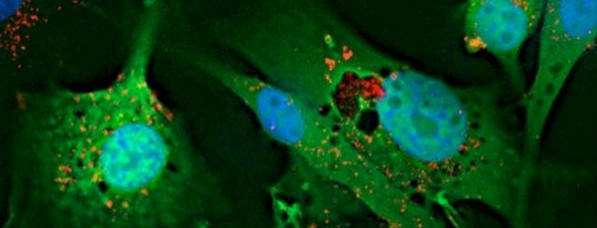
Personalized immunotherapy to fight deadly brain tumors
UC enrolling patients in glioblastoma trial
Glioblastomas (GBM) are the most aggressive and deadly kind of brain tumors, with less than 7% of patients surviving to 5 years after diagnosis.

Soma Sengupta, MD, PhD. Photo/UC Health.
The University of Cincinnati is a study site for a new Phase 2b clinical trial, sponsored by biotechnology company Imvax, Inc. that will test a personalized immunotherapy approach designed to work similarly to a vaccine by training the immune system to fight the tumor.
Soma Sengupta, MD, PhD, site principal investigator and a University of Cincinnati Cancer Center physician-researcher, explained the trial will enroll patients newly diagnosed with GBM. Patients will undergo brain tumor neurosurgery at the UC Gardner Neuroscience Institute to remove the tumors, and researchers will create a personalized vaccine from patients’ own brain cancer cells.

David W. Andrews, MD, chief medical officer at Imvax. Photo provided by Imvax, Inc.
From there, the tumor cells will be shipped to Imvax’s facility. The cells are combined with a drug called IMV-001 and incubated in biodiffusion chambers to form a personalized immunotherapy treatment against the patient’s specific cancer cells. The chambers are then implanted into the patient’s abdomen and removed 48 hours later, after the immune system has had a chance to train itself to fight the tumor.
“Your own immune system is then working on that tumor,” said Sengupta, UC associate professor in neurology, director of neuro-oncology clinical trials, associate director of the Brain Tumor Center and a UC Health neuro-oncologist, funded by the Harold C. Schott Endowed Chair in Molecular Therapeutics (Neurosurgery) and the Pam and Tom Mischell Funds. “It’s a state-of-the-art, immune-mediated vaccine from your own body, and it’s personalized medicine at its best.”

The personalized immunotherapy treatment is incubated in biodiffusion chambers like this, implanted into the patient's abdomen and removed 48 hours later after the immune system has trained itself to fight the tumor. Photo provided by Imvax, Inc.
Patients in the trial will be randomized to either receive the personalized immunotherapy or a placebo of inactive solution in the biodiffusion chamber. After the chambers are removed, the patients will continue the current standard of care of outpatient chemotherapy and radiation following surgery.
The Phase 1 trials showed the approach was safe, and this phase of the trial will assess progression-free survival and overall survival of patients treated with the Imvax therapy.
“Survival with that standard of care with surgery, radiation and chemotherapy is about two years, and this therapy has the promise of extending survival beyond that,” Sengupta said.

Mario Zuccarello, MD, left, the John M. Tew MD endowed chair in neurosurgical oncology at the UC College of Medicine and director of the UC Health Brain Tumor Center, will lead the brain tumor neurosurgery team at UC for the Imvax trial.
“The commencement of this autologous cell-based immunotherapy Phase 2b trial is a significant milestone for GBM patients,” said David W. Andrews, MD, chief medical officer at Imvax. “Imvax is greatly indebted to academic leaders like Dr. Sengupta and the University of Cincinnati who are participating in this trial for the benefit of these patients. Our hope is that this trial will ultimately provide support for a new and better treatment option for the many patients diagnosed each year with this intractable disease.”
A total of 93 patients across up to 25 trial sites will be enrolled in the trial, with an estimated seven to 14 patients expected to enroll at UC.
Patients must be newly diagnosed with GBM and have not had surgery yet to be eligible for the study. For more information, contact University of Cincinnati Brain Tumor Center Nurse Navigator Jamie Denlinger, RN, at 513-675-9656.
Featured photo at top of glioblastoma cells in culture courtesy of National Cancer Institute.
Impact Lives Here
The University of Cincinnati is leading public urban universities into a new era of innovation and impact. Our faculty, staff and students are saving lives, changing outcomes and bending the future in our city's direction. Next Lives Here.
Related Stories
The biggest skin-care trends of 2026 go back to basics
January 8, 2026
The University of Cincinnati's Kelly Dobos was featured in an Allure article discussing the biggest skin-care trends of 2026.
World class: Alumni travel program connects Bearcats on global scale
January 7, 2026
Most people have a natural curiosity to see the world. Meanwhile, most Bearcats enjoy being around other Bearcats. Alumni can check both boxes through the UC Alumni Association’s travel program, which offers about half a dozen excursions each year to fascinating places around the globe.
UC launches Bearcat Affordability Grant
January 7, 2026
The University of Cincinnati is making college more attainable for students across Ohio with the creation of the Bearcat Affordability Grant. The new grant will provide a pathway to tuition-free college for students of families who make less than $75,000 per year. Beginning in fall 2026, the Bearcat Affordability Grant will cover the remaining cost of tuition for Ohio residents who are Pell eligible.
